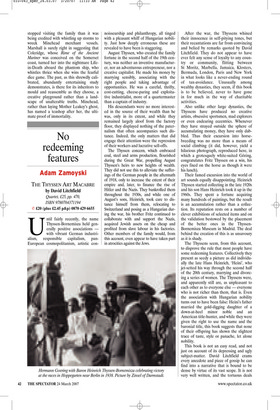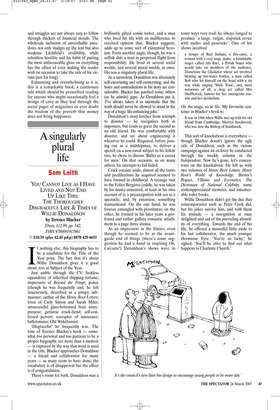No redeeming features
Adam Zamoyski
THE THYSSEN ART MACABRE by David Litchfield Quartet, £25, pp. 470, ISBN 9780704371194 ✆ £20 (plus £2.45 p&p) 0870 429 6655 Until fairly recently, the name Thyssen-Bornemisza held generally positive associations with vibrant German industrialism, responsible capitalism, pan European cosmopolitanism, artistic con noisseurship and philanthropy, all tinged with a pleasant whiff of Hungarian nobility. Just how deeply erroneous these are revealed to have been is staggering.
August Thyssen, who created the family fortune in the second half of the 19th century, was neither an inventive manufacturer, nor an adventurous entrepreneur, nor a creative capitalist. He made his money by marrying sensibly, associating with the right people and taking advantage of opportunities. He was a careful, thrifty, cost-cutting, cheese-paring and exploitative industrialist, more of a quartermaster than a captain of industry.
His descendants were no more interested in the source of their wealth than he was, only in its extent, and while they remained largely aloof from the factory floor, they displayed nothing of the paternalism that often accompanies such distance. Indeed, the only matters that did engage their attention were the repression of their workers and lucrative sell-offs.
The Thyssen concern, which embraced coal, steel and arms production, flourished during the Great War, propelling August Thyssen’s heirs to new heights of wealth. They did not use this to alleviate the sufferings of the German people in the aftermath of 1918, only to increase the extent of their empire and, later, to finance the rise of Hitler and the Nazis. They bankrolled them throughout the 1930s, and while one of August’s sons, Heinrich, took care to distance himself from them, relocating to Switzerland and posing as a Hungarian during the war, his brother Fritz continued to collaborate with and support the Nazis, acquired Jewish assets on the cheap and profited from slave labour in his factories. Other members of the family would, from this account, even appear to have taken part in atrocities against the Jews. After the war, the Thyssens whined their innocence in self-pitying tones, but their recantations are far from convincing and belied by remarks quoted by David Litchfield. They do not appear to have ever felt any sense of loyalty to any country or community, flitting between St Moritz, Marbella, Jamaica, Klosters, Bermuda, London, Paris and New York in what looks like a never-ending round of tax-avoidance. Unusually among wealthy dynasties, they seem, if this book is to be believed, never to have gone in for much in the way of charitable activities.
Also unlike other large dynasties, the Thyssens have produced no creative artists, obsessive sportsmen, mad explorers or even endearing eccentrics. Whenever they have strayed outside the sphere of accumulating money, they have only dabbled. Thus their excursion into horsebreeding was no more than a means of social climbing (it did, however, yield a hilarious photograph, reproduced here, in which a grotesquely white-suited Göring, congratulates Fritz Thyssen on a win, his eyes fixed on the horse as though it were his lunch).
Their famed excursion into the world of art sounds equally disappointing. Heinrich Thyssen started collecting in the late 1920s and his son Hans Heinrich took it up in the 1960s. They spent a fortune acquiring many hundreds of paintings, but the result is an accumulation rather than a collection. Its reputation rests on a number of clever exhibitions of selected items and on the validation bestowed by the placement of the better ones in the ThyssenBornemisza Museum in Madrid. The deal behind the creation of this is as unsavoury as it is shady.
The Thyssens seem, from this account, to disprove the rule that most people have some redeeming features. Collectively they present as seedy a picture as did individually the late Hans Heinrich, ‘Heini’, who jet-setted his way through the second half of the 20th century, marrying and divorcing a series of women. The Thyssens were, and apparently still are, as unpleasant to each other as to everyone else — everyone who is not richer than them, that is. Even the association with Hungarian nobility turns out to have been false: Heini’s father married the gold-digging daughter of a down-at-heel minor noble and an American title-hunter, and while they were given the right to use the name and the baronial title, this book suggests that none of their offspring has shown the slightest trace of taste, style or panache, let alone nobility.
This book is not an easy read, and not just on account of its depressing and ugly subject-matter. David Litchfield crams every anecdote and piece of gossip he can find into a narrative that is bound to be dense by virtue of its vast scope. It is not very well written, and the tortuous deals and struggles are not always easy to follow through thickets of financial details. The wholesale inclusion of unverifiable anecdotes not only sludges up the text but also weakens Litchfield’s credibility, while relentless hostility and his habit of putting the most unfavourable gloss on everything has the effect of even making the reader wish on occasion to take the side of his victims (not for long).
Exhausting and overwhelming as it is, this is a remarkable book, a cautionary tale which should be prescribed reading for anyone who might occasionally feel a twinge of envy as they leaf through the social pages of magazines or ever doubt the wisdom of the proverb that money does not bring happiness.



















































































 Previous page
Previous page